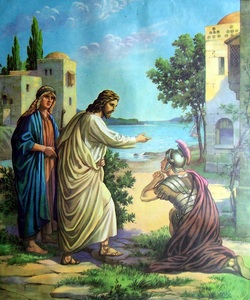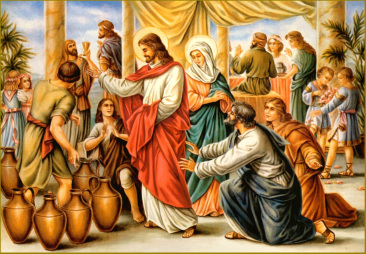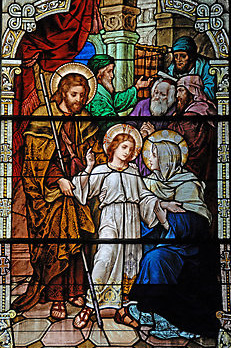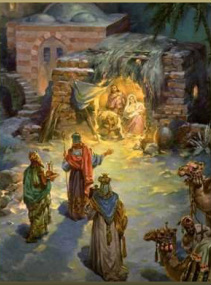
Once when Our Lord was coming down from a mountain, followed by a great crowd of people. He entered the city of Capharnaum. At the city gates there was a poor leper, who, bowing down profoundly, addressed Jesus and cried out:
"Lord! if Thou wilt. Thou canst make me clean."
Leprosy is a very filthy, disgusting disease. The whole
body is covered with a false dry skin like scales, so that the person becomes a most hideous and loathsome object. In the East and in this country, too, leprosy is considered contagious, and the laws of sanitary boards separate people afflicted with it from those that are well, and will not allow lepers to come into the cities. This picture is but a very insignificant description of leprosy. You must see it to know how loathsome it really is.
When you read the description of leprosy think of that other kind of leprosy of the soul, for sin is the leprosy of the soul, and is as filthy and more so than the leprosy of the body. Yes, it is the leprosy of sin that makes the soul a horrible sight before God and the angels. The leprous souls that live in so many human bodies in cities and villages are not subject to any laws. They can remain where they please, and still we know that nothing is more contagious than the leprosy of sin. Thus it is that sin is continually growing and spreading, until we find it in every nook and corner of the world. How rare it is to find youths not infected with some vice or other! How few are untouched by this contagion, or who have preserved their baptismal innocence!
If you are already covered with the leprosy of sin, ah, then cry out: "Lord, you see how miserable my condition is! Heal me cleanse me. You see that my mouth is infected because
such bad words, blasphemies, and curses are continually flowing from it. You see, Lord, that my body and my senses are infected with this terrible disease, for it induces the soul to commit the sins of impurity." If you pray in this manner, humbly and confidently, you will hear in your soul the consoling words,
"Yes, I will help you to overcome that vice. I will forgive you and give you the grace of remaining good.'' But Our Lord adds:
"Go and show yourselves to the priest." The priest is the minister of God. He will extend his hands over you, and you will be made whiter than snow. You will start up into a new life, in which you will acquire again the merits of your good actions, which would never have been any benefit to you unless you had thus repented. From slaves of Satan you will become adopted sons of God, co-heirs with Jesus Christ.
But remember well, my beloved children, that you must have a good will. St. Augustine says that God cures all evils, but only those which we really want to be cured. The unhappy leper really wished to be healed, for he realized the sad condition he was in, and Jesus immediately extended His hand and touched him. We admire the power of Christ, for at once the whole body was healed. It was again full of vigor and health. Jesus did not give him time to burst out in sentiments of wonder, exultation or gratitude, but said:
"See thou tell no man, but go, show thyself to the priest." The man obeyed, and as he went he could not help letting people know what Jesus had done for him. The fame of this miracle spread about the country and drew many to look for help from Our Lord.
There was in Caphamaum a centurion, a soldier and a heathen, whose servant lay at the point of death. He came to Our Lord and laid his trouble before Him:
"My servant lieth at home sick of the palsy, and is grievously tormented.''
"I will come and heal him," said Our Lord. But the centurion did not expect so great a favor; he repeated those admirable words: " Lord I am not worthy that Thou shouldst enter under my roof, but only say the word and my servant shall be healed."
These words are so applicable to all poor sinners who are about to receive the visit of the Lord, that the Church has borrowed them and uses them three times when communion is to be given. We should repeat them with a heart full of confusion, because even though we possessed the purity of an angel and the sanctity of John the Baptist, we would not be worthy to receive in our heart Our Lord Jesus. Therefore ought we do all in our power to be free from sin, that we might be the less unworthy to receive Jesus in the great Sacrament of His love.
There are few young people who are so impressed with the sublimity of this holy Sacrament that they approach it with sentiments of respect and veneration. On the contrary they generally go without proper dispositions. They do not endeavor to excite in themselves the sentiments of devotion and love of God which are required to make a good communion. But there are many, too, who are unworthy to receive Jesus in their heart because their souls are blackened with crime. They defile their tongues with impure conversations, and they dare to receive on them the body of Christ. They defile their bodies with impurities and into these they dare to introduce the Holy of holies. They give scandal and they wish to receive Jesus. They go to confession and if the priest refuse them absolution because he sees no signs of amendment, they go to another, who is easier, so that they may get through. How blind such young people are! They do not comprehend that they are making a bad communion.
Go, of course, frequently to communion, but do so with a pure heart, and free from sin, full of humility, reverence, and love. When the time approaches for communion, call on the angels, the archangels and all the holy spirits, and beg of them to accompany you to the banquet of Our Lord.
When Our Lord heard the humble words of the centurion He was struck with astonishment and said,
"Amen, I say to you, I have not found so great a faith in Israel." It was certainly a great act of faith, and that was the reason it drew on the centurion that commendation which the Lord seldom gave. The centurion trusted in the power and goodness of Our Lord. He knew, too, that it was not necessary for Our Lord to come to his house. He knew He was God, or at least had the power of God at His command. For this faith and trust Our Lord broke forth into unusual praise.
Even among faithful Christians it is rare to find those who really trust in God. They put trust in their friends, in their own smartness and strength, but they do not remember that they have a God at their command to whom they may go with all confidence. We trust too much to our friends in many things and even prefer them to God.
Here is a young man who, meeting his companions, goes with them to lunch. It is Friday. The young man refuses to eat meat, but his companions persuade him. " Oh, eat it! What wrong can there be? " He yields, and the sin is committed.
Another meets a companion on the street. "Where are you going?" "To hear a sermon," is the reply. " Oh, don't be so foolish as to sit there to listen to such an insignificant preacher. That is good enough for doting old people or pious women. Come, let us go to the theatre. You will see nice things; you will laugh and be happier there than in church." He goes out of friendship for his companion. He witnesses the derision of his religion, or immoral scenes; he sees many things that please the eye and stir his sensuality. He hears many improper things; his mind is filled with loose sayings and bad thoughts, and all this has happened simply to please a friend. You see then how obsequious you are to your friends, but of God and Christ you make no account.
When Our Lord had said the words of commendation to the centurion He added: "Many shall come from the east and the west and shall sit down with Abraham and Isaac and Jacob in the kingdom of heaven, but the children of the kingdom shall be cast out into the exterior darkness." God is merciful to all; He calls all; but they must have the faith of the centurion. Then He turned again to the centurion and said,
"Go, and as thou hast believed so be it done to thee." That same moment the servant was healed, and when
the centurion arrived home he found the man perfectly restored to health. Just reflect a moment on these words of Our Lord. " The children of the kingdom shall be cast out into the exterior darkness; there shall be weeping and gnashing of teeth.'' Terrible words; but which will prove as true to many Christians as they were to many of the Jews. Not a day passes but many infidels and idolaters come to the faith, are converted, and enter the kingdom of God, while many Christians born in the faith, brought up and educated in it, perish miserably in eternal damnation. A damned soul once returned to the earth and asked whether there were any good people still on earth, for he had seen such innumerable multitudes going to hell that he thought there could not be one left. St. Bernard understood so well the misery of those who went to hell that he used to say,
''If out of all the human race, who number thousands of millions of souls, it were known that only one was to go to hell, I would tremble with fear lest I should be that miserable one." 0, my dear young people, let us make up our minds that we will not be of the number of the wicked Christians who will lose their places in heaven which were marked out for them from all eternity had they remained faithful. Are we, the sons of the kingdom, we, the adopted sons of God, to be excluded from our future heritage in heaven and thrown out into darkness?
Oh, since the Lord has been so good to us that we have received the grace of being born in a Christian family, let us beg also the grace to remain faithful to Christ and love Him so dearly that we may enter the heavenly kingdom which is ours by right. At the same time knowing that many places are left vacant in heaven by bad Christians, let us beg Our Lord to send His light to the east and west and bring many to occupy these seats of glory.



 RSS Feed
RSS Feed